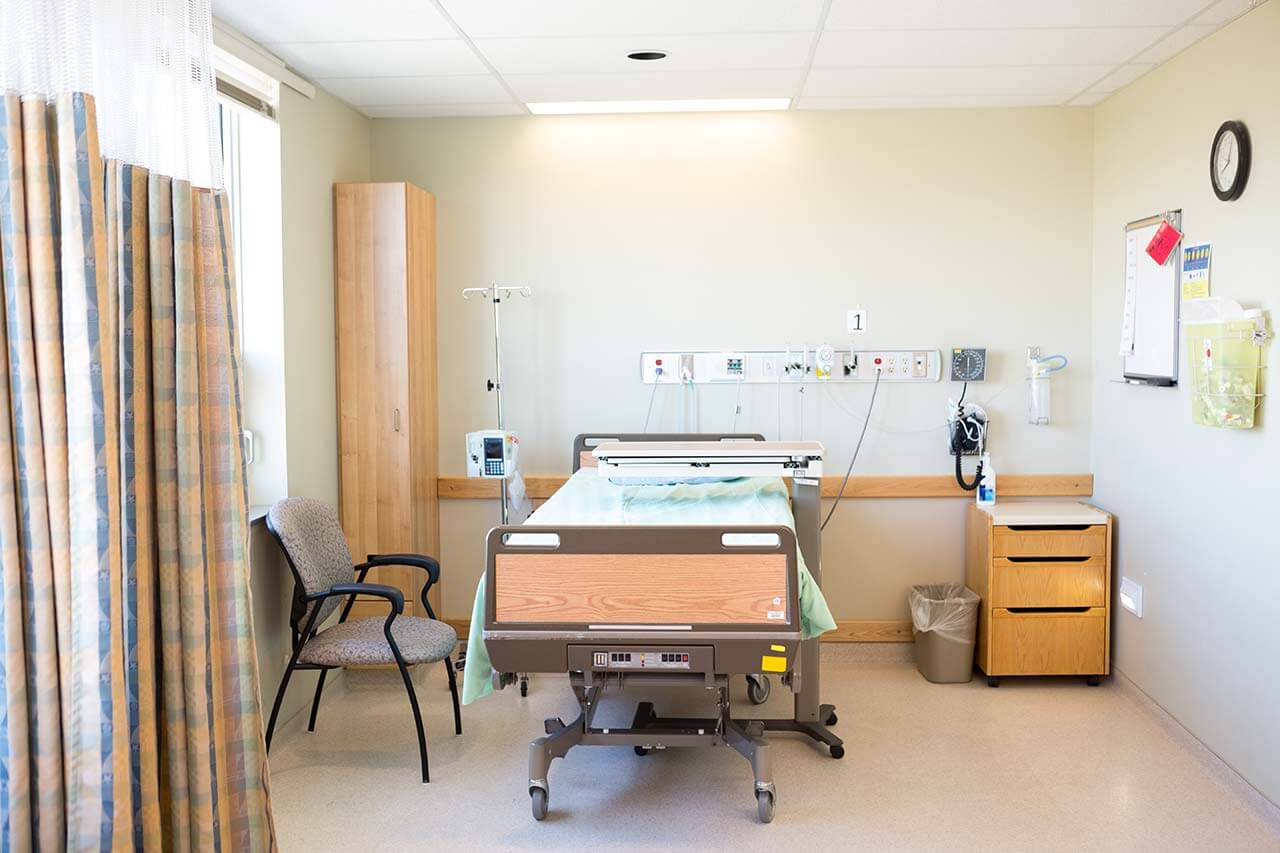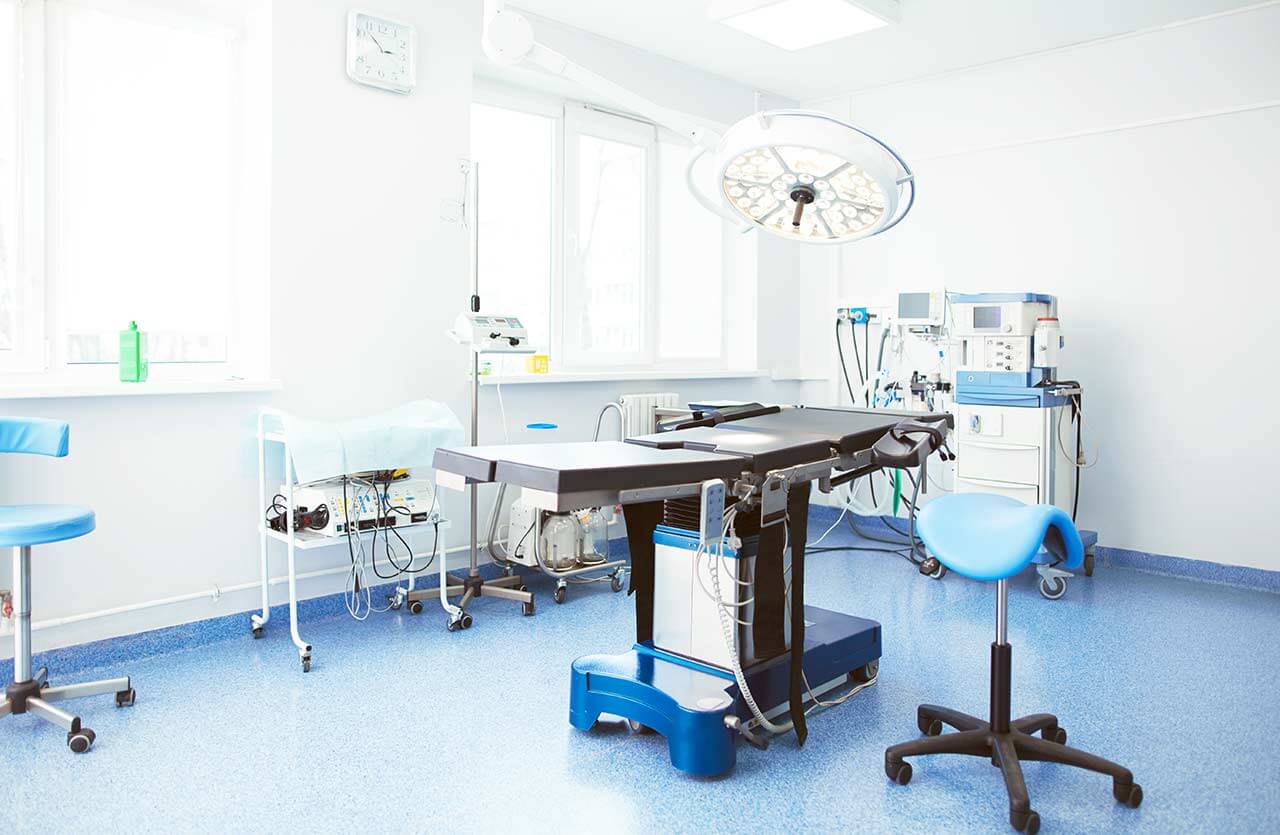
The program includes:
- Initial presentation in the clinic
- clinical history taking
- review of medical records
- physical examination
- laboratory tests:
- complete blood count
- general urine analysis
- biochemical blood test
- inflammation markers (CRP, ESR)
- blood coagulation analysis (aPTT, PT, INR)
- ophthalmological examination
- Schirmer test
- nursing services
- services of all leading experts
- explanation of individual treatment plan
Required documents
- Medical records
Service
You may also book:
 BookingHealth Price from:
BookingHealth Price from:
About the department
The Department of Adult and Pediatric Ophthalmology at the Schlosspark Hospital Berlin provides the full range of medical services for the diagnostics and treatment of eye diseases. The primary focuses of the department's specialists include the treatment of cataracts, glaucoma, corneal diseases, and strabismus. Depending on the complexity of the clinical case, treatment can be carried out both on an inpatient and outpatient basis. The department admits patients of all ages, including children. The medical facility offers excellent diagnostic options, including optical coherence tomography, fluorescein angiography, fundus photography, eye ultrasound scanning, biometrics using the IOL Master device, perimetry, corneal topography, and other tests. The department has advanced operating rooms for surgical treatment, within which more than 4,000 surgical interventions are performed annually. Such a large number of operations testifies to the vast clinical experience of doctors and the high level of confidence of patients. The department's doctors always devote enough time to counseling patients and talking about possible treatment options and expected treatment outcomes.
The department is headed by Prof. Dr. Dr. med. Peter Rieck. The doctor has been treating ophthalmic diseases for over 30 years and regularly demonstrates excellent results. The specialist has performed more than 20,000 successful surgical interventions on the cornea, lens of the eye, and for glaucoma. Prof. Peter Rieck is also active in research and shares his clinical experience with colleagues at national and international congresses.
One of the most common ophthalmic diagnoses in the department's clinical practice is cataract. The disease causes partial or total clouding of the lens, as a result of which a person's vision deteriorates. The most effective treatment for this pathology is surgery called ultrasonic phacoemulsification, followed by the implantation of an intraocular lens (an artificial lens). Depending on the clinical case, the operation can be performed on an outpatient or inpatient basis. The department's ophthalmologists make a decision on the advisability of cataract surgery after examining the eye with a slit lamp, assessing visual acuity, examining the fundus, assessing visual fields, measuring intraocular pressure, and conducting other diagnostic tests. The operation is performed under injectable local anesthesia or under local anesthesia using eye drops. The duration of the procedure is 15 to 20 minutes. The essence of the operation is to remove the clouded lens and replace it with an artificial intraocular one. The department's doctors use in their clinical practice monofocal aspheric lenses, multifocal lenses, toric lenses, and others.
The department also provides medical care to patients with glaucoma. In cases of this pathology, a person has an impaired outflow of aqueous humor from the eyeball, as a result of which intraocular pressure rises and the optic nerve is affected. As glaucoma progresses, the patient's vision deteriorates, and if left untreated, they are threatened with total blindness. The department's ophthalmologists use both conservative and surgical treatment methods to eliminate glaucoma. Conservative therapy is aimed at lowering intraocular pressure. The patient is prescribed eye drops and drug therapy that positively affect the blood supply and the functioning of the optic nerve. With appropriate clinical indications, the department also uses a non-invasive laser technique called selective laser trabeculoplasty to treat glaucoma. The procedure improves the outflow of aqueous humor, which ultimately helps lower intraocular pressure. Selective laser trabeculoplasty is performed under local drip anesthesia and takes only a few minutes. The last-line therapy for glaucoma is surgery. These may be minimally invasive surgery, trabeculectomy, or surgery to implant drainage devices. The optimal type of treatment is determined by the attending ophthalmologist, depending on the stage and type of glaucoma.
The department's specialists also successfully perform simultaneous operations to treat glaucoma and cataracts. If the patient has both of these pathologies, first a surgical intervention is performed to normalize the outflow of aqueous humor from the eye, after which the ophthalmic surgeon removes the lens and implants a pre-selected intraocular lens in its place. All the necessary therapeutic manipulations can thus be performed during a single surgical intervention, thanks to which it is possible to maintain and improve vision.
The focus of the department's specialists is also on the treatment of corneal diseases. In cases of serious pathological changes, the patient is indicated for a donor corneal transplant. The department uses the latest surgical techniques that eliminate the risk of rejection of a donor organ and guarantee rapid vision restoration. The DMEK technique (Descemet Membrane Endothelial Keratoplasty) deserves special mention. During the DMEK operation, an ultra-thin graft is transferred to the surface of the eye without any contacts, using a small air cushion on the inside of the recipient's cornea. The operation is especially effective for endothelial corneal dystrophy (Fuchs' dystrophy).
The department's range of medical services includes:
- Conservative and surgical treatment of cataracts
- Conservative therapy with eye drops (at the early stages of the pathology)
- Surgical treatment with the removal of the lens and its replacement with an intraocular lens
- Conservative and surgical treatment of glaucoma
- Drug therapy
- Laser therapy (selective laser trabeculoplasty)
- Minimally invasive surgery, trabeculectomy, or surgery to implant drainage devices
- Treatment of corneal diseases (focus on corneal transplant using the DMEK technique)
- Retinal and vitreous surgery
- Surgery for retinal detachment
- Surgery for epiretinal fibrosis
- Surgery for macular hole
- Surgery for vitreous hemorrhage
- Surgery for macular edema in age-related macular degeneration, diabetic retinopathy, venous occlusion, or severe forms of myopia
- Surgery for retinal degeneration
- Surgery for proliferative diabetic retinopathy or vascular occlusion
- Treatment of keratoconus with crosslinking
- Conservative and surgical treatment of visual impairments
- Strabismus correction in adults and children
- Amblyopia correction
- Binocular diplopia correction
- Treatment of eye muscle paresis
- Treatment of asthenopia
- Eyelid surgery
- Surgery for dermatochalasis
- Surgery for ptosis
- Surgery for ectropion and entropion
- Surgery for eyelid tumors
- Tear duct surgery
- Correction of congenital narrowing or obstruction of the tear duct (dacryostenosis)
- Other medical services
Curriculum vitae
Higher Education, Postgraduate Training and Professional Career
- Medical studies at the University of Cologne and biological studies at the University of Paris.
- 1988 Admission to medical practice.
- 1991 Thesis defense on the treatment of corneal diseases and doctorate, University of Cologne.
- 1992 - 1997 Preparation for board certification in Ophthalmology, University Hospital Cologne and Charite University Hospital Berlin.
- 1996 Thesis defense at Paris Descartes University.
- 1997 Board certification in Ophthalmology.
- 1998 - 2005 Senior Physician, Department of Ophthalmology, Charite University Hospital Berlin.
- 2004 Professorship.
- 2005 - 2011 Deputy and Acting Head of the Department of Ophthalmology, Charite University Hospital Berlin.
- 2012 Head Physician of the Department of Ophthalmology at the Berlin Marzahn Eye Clinic and Medical Director of this clinic.
- 2013 Managing Senior Physician, Department of Adult and Pediatric Ophthalmology at the Schlosspark Hospital Berlin.
- Since 09.2019 Head Physician, Department of Adult and Pediatric Ophthalmology at the Schlosspark Hospital Berlin.
Awards and Honors
- 2000 Merck, Sharp & Dohme International Award for Research on Optimizing Donor Cornea Preservation.
- 2005 Chibret Goldmedaille as recognition of the doctor's personal contribution to the development of Franco-German cooperation in Ophthalmology.
- 2007 Appointed as the sole foreign delegate of the French Society of Ophthalmology (SFO) responsible for the cooperation of the French Society of Ophthalmology (SFO) with the German Society of Ophthalmology (DOG).
- Since 07.2016 Visiting Professorship at the Faculty of Medicine of the University of Geneva, Switzerland.
Memberships in Professional Societies
- German Society of Ophthalmology (DOG).
Publications
- Over 100 publications, including 68 original articles in peer-reviewed journals and 11 chapters in books.
- Over 250 annotations.
- Over 300 reports at national and international congresses.
- Numerous presentations as an invited speaker.
Photo of the doctor: (c) Schlosspark-Klinik GmbH
About hospital
The Schlosspark Hospital Berlin began its work in 1970 and, during this time, has gained an excellent reputation not only in Germany but also in the international medical arena. The Schlosspark Hospital Berlin is an academic hospital of the Charite University Hospital Berlin, which is one of the best medical centers in Europe and throughout the world. The successful clinical practice of the medical facility is based on an advanced medical and technical base, access to the very latest and most effective treatment methods, and the exceptional competence and experience of medical personnel. The hospital is located in the picturesque Charlottenburg Park, away from the hustle and bustle of the city, which contributes to the peace of mind of patients.
The hospital's bed fund includes 340 beds. Structurally, the hospital consists of 12 specialized departments with narrowly focused centers integrated into them, which are responsible for the treatment of a particular group of diseases. More than 14,000 patients are treated annually at the hospital. One of the priorities of the medical facility is emergency medical care. With an annual number of more than 10,000 surgical interventions, including operations of high complexity, the department is particularly interested in surgical treatment.
The hospital's medical team consists of more than 900 employees. The departments at the hospital are headed by professors who are well-known in the medical community and have impressive clinical experience and outstanding professional achievements. In the course of diagnostics and treatment, an individual approach is used for each patient, and his needs and wishes are also taken into account. The hospital pays due attention to patient care during the therapeutic process. Despite state-of-the-art medical equipment and the automation of many processes, a humane and respectful attitude towards the patient is the first priority for the doctors at the hospital. The specialists are always open to dialogue and do their best to achieve the best treatment outcomes.
Photo: (с) depositphotos
Accommodation in hospital
Patients rooms
The patients of the Schlosspark Hospital Berlin live in comfortable rooms with light colors. Each patient room has an ensuite bathroom with a shower and a toilet. The standard patient room includes a comfortable automatically adjustable bed, a bedside cabinet with a pull-out table, a wardrobe, a table and chairs for receiving visitors, a telephone, and a TV. Wi-Fi is available on the territory of the hospital. The hospital also offers enhanced-comfort rooms with a more exquisite design.
Meals and Menus
The patient and their accompanying person are offered three meals a day: breakfast, lunch, and dinner. A new menu is prepared for patients each week. Only high-quality and fresh products are used for cooking meals. The menu includes dietary and vegetarian dishes. The patient will be offered an individual menu if necessary.
There is a cozy cafe on the ground floor of the hospital that serves full breakfasts, a wide range of hot and cold drinks, delicious desserts, and snacks.
Further details
Standard rooms include:
Accompanying person
The accompanying person may stay with you in the patient room or at the hotel of your choice during the inpatient program.
Hotel
You may stay at the hotel of your choice during the outpatient program. Our manager will help you choose the best option.




